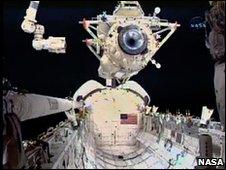Russian module added to station
- Published

Rassvet is lifted out of the shuttle's payload bay
Astronauts have succeeded in attaching a new Russian module to the International Space Station (ISS).
The 7m-long unit known as Rassvet was put in place in a delicate manoeuvre by the platform's robotic arm.
The module, brought up by the Atlantis shuttle, is a docking and storage facility.
As well as being packed with over a tonne of stores, it carries equipment for a Russian science lab which will join the ISS in 2012.
The berthing of Rassvet was considered to be one of the trickest tasks on the visiting shuttle astronauts' to-do list.
Russian modules are normally flown into place, and there was some concern that the use of a robotic arm might not engage properly the latches and locks on the attachment mechanism.
In the event, the procedure passed off without incident.
Shuttle commander Ken Ham and pilot Tony Antonelli used the shuttle robotic arm to pick up Rassvet from Atlantis's payload bay and hand it over to the station's arm.
Mission specialists Garrett Reisman and Piers Sellers then carried out the berthing task - Reisman operating the arm and Sellers calling the milestones and running the computer connection to the module.
The Atlantis orbiter is making what many expect to be its final mission into space before retirement. Its crew have already installed a spare communications antenna and a tool tray for the station's Dextre robot. In two remaining spacewalks in the coming days, they will substitute six new batteries on the exterior of the platform, packing away the old power units in Atlantis for the return to Earth.
When it comes back from the station, Atlantis will not go straight to a museum. It will instead be prepared as a standby vessel ready to go to the rescue of the astronauts on the Endeavour shuttle's November's flight to the ISS, should they get into trouble.
Nasa has not excluded the possibility that it could yet fly out the standby Atlantis to take additional spares and supplies to the space station.
The next shuttle mission - what should be the second to last - will see Discovery deliver a container full of supplies and spares to the ISS. Nasa is working towards a September lift-off.
- Published17 May 2010